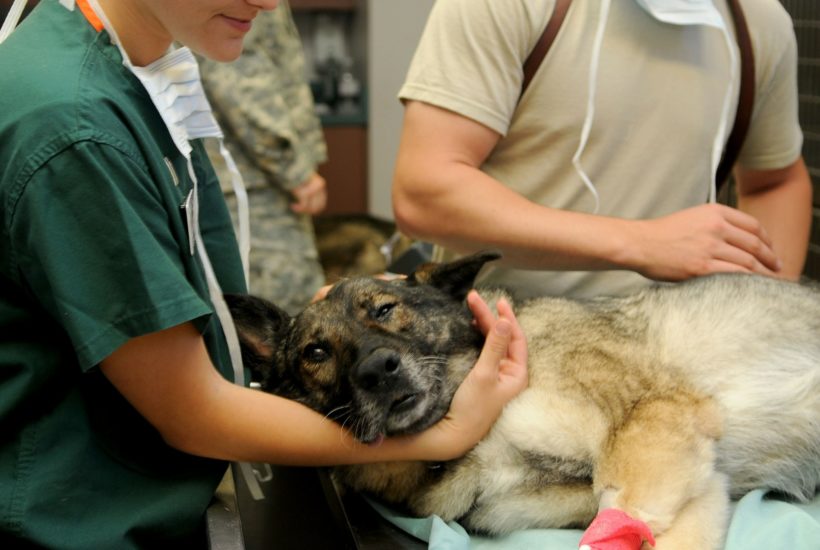Cannabis
Brazil’s campaign to legalize cannabis use in veterinary medicine
Dr. Amazonas currently coordinates a research group on medical cannabis for the school of veterinary medicine at the Federal University of Santa Catarina, Brazil. He is also a member of the scientific board for the Brazilian Association of Medical Cannabis (ABRACAM), the Brazilian Association of Medical Cannabis Patients (Ama+Me), and the Brazilian Society for the Study of Cannabis (SBEC).

Veterinarian Erik Amazonas, professor at the Federal University of Santa Catarina (UFSC), is one of the main researchers and promoters of Cannabinoid Veterinary Medicine in Brazil.
He teaches the pioneering discipline of endocrinology at UFSC and recently helped bring to Florianopolis the 1st International Symposium on the subject, a meeting that brought together several professionals from the U.S. on the Island of Magic.
However, as Brazil advances in medical cannabis for human use, for animals, the subject has never evolved. That’s why Amazonas decided to start a national campaign for this regulation. In November, he presented a manifesto to the Regional Council of Veterinary Medicine of SC today has the support of the entity.
The latest CBD & Cannabis updates are now at your fingertips, with notifications and fresh information offered by our companion CBD News App. Stay up-to-date with marijuana stocks for investments, global market, cannabis legalization and more.
Regulation for cannabis use in animals
The veterinarian has already submitted a legislative petition in the Federal Senate asking for an “adequate regulation for the use of cannabinoids in animals, based on the scientific principles, and of the veterinary ethics code, aiming at the development of the Cannabinoid Veterinary Medicine in Brazil.”
If the petition receives 200,000 signatures, the idea will become a Legislative Suggestion, and from then on it will be debated by Senators. In October, a Legislative Suggestion (06/16) that provided for “a comprehensive regulatory standard for medicinal cannabis and industrial hemp in Brazil” became a Bill (5295/19) and is already under discussion in the House. Erik hopes the same will happen with his proposal.
According to the professor, the Ministry of Agriculture, which is the one that regulates the Veterinary in the country, is dismissive about the subject. The Anvisa, in the regulation approved in December, did not include the veterinary use as part of the document.
Can animals also be treated with cannabis?
Humans share much of the physiological processes of animals, especially dogs, cats, and horses. The therapeutic power of cannabis is not the plant, but a physiological system that all vertebrate animals have, which is the endocannabinoid system. So we are modulating that system has the therapeutic functions of cannabis. It’s exactly the same therapeutic target as human cannabinoid medicine.
Veterinary medicine is a mirror of human medicine, with one advantage: we have more studies in veterinary medicine than in human medicine, in practice. All the studies that came in human medicine passed some stage before human beings, in some animal species, and many of them used the dogs themselves, so we can get data directly from there.
There are several studies that would be pre-clinical from the human point of view, but that extrapolate directly for clinical use for animal treatments. The problem is that many veterinarians are reluctant to try new treatments as they have yet to make this connection and believe that not enough studies have been undertaken to prove that cannabis is safe for animals. In many ways the reality is the opposite.
What is the risk of THC poisoning in domestic animals?
In veterinary medicine, Erik Amazonas has had better experiences with THC-rich oils than CBD. In his opinion the most effect treatment for various animals is an oil that has 50×1 THCxCBD. One specific case is Yara, who is using 2.5 mg/ml THC and Amazonas has seen no side effects.
Most of the feedback the vet receives is positive. Many of the animals recover to the point they were before the disease and as far as Amazonas can discern there has been no damage to the animal in question.
Despite promising signs it is likely that more studies need to be undertaken before vets are willing to take the dive and test cancer based treatments for animals in the near future.
__
(Featured image by 12019 via Pixabay)
DISCLAIMER: This article was written by a third party contributor and does not reflect the opinion of Born2Invest, its management, staff or its associates. Please review our disclaimer for more information.
This article may include forward-looking statements. These forward-looking statements generally are identified by the words “believe,” “project,” “estimate,” “become,” “plan,” “will,” and similar expressions. These forward-looking statements involve known and unknown risks as well as uncertainties, including those discussed in the following cautionary statements and elsewhere in this article and on this site. Although the Company may believe that its expectations are based on reasonable assumptions, the actual results that the Company may achieve may differ materially from any forward-looking statements, which reflect the opinions of the management of the Company only as of the date hereof. Additionally, please make sure to read these important disclosures.
First published in SECHAT, a third-party contributor translated and adapted the article from the original. In case of discrepancy, the original will prevail.
Although we made reasonable efforts to provide accurate translations, some parts may be incorrect. Born2Invest assumes no responsibility for errors, omissions or ambiguities in the translations provided on this website. Any person or entity relying on translated content does so at their own risk. Born2Invest is not responsible for losses caused by such reliance on the accuracy or reliability of translated information. If you wish to report an error or inaccuracy in the translation, we encourage you to contact us.

-

 Crypto2 weeks ago
Crypto2 weeks agoCaution Prevails as Bitcoin Nears All-Time High
-

 Fintech2 days ago
Fintech2 days agoOKX Integrates PayPal to Simplify Crypto Access Across Europe
-

 Africa1 week ago
Africa1 week agoBridging Africa’s Climate Finance Gap: A Roadmap for Green Transformation
-

 Business1 week ago
Business1 week agoThe TopRanked.io Weekly Digest: What’s Hot in Affiliate Marketing [uMobix Affiliate Program Review]
























